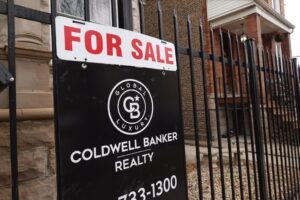The consensus among Wall Street and economists is that 2023 will bring a recession. But there is still a debate on how long or severe it will be, with some talking about a so-called rolling recession. According to a recent Morning Consult poll, half of Americans believe the United States is already there as rampant price inflation continues to eat away at wages and budgets. But now that the public has been introduced to the term rolling recession, what does it even mean exactly?
America’s Rolling Recession
 The term describes a period in which parts of the economy slow down or contract while other aspects of the economic landscape run along. “I’ve just been calling it a rolling recession,” said Liz Ann Sonders, chief investment strategist with Charles Schwab.
The term describes a period in which parts of the economy slow down or contract while other aspects of the economic landscape run along. “I’ve just been calling it a rolling recession,” said Liz Ann Sonders, chief investment strategist with Charles Schwab.
This might make sense after the US entered a technical recession in the first half of 2022 – back-to-back quarters of negative growth – and posted 3.2% and 2.9% growth in the year’s second half. Right now, the manufacturing, housing, and technology sectors are ostensibly entrenched or sliding into a recession. But other industries, such as services, are recovering and growing.
Respect the Blood Bath and Beyond Pump
Despite rising interest rates, meme-mania was reborn this month as some of the social media-fueled stocks enjoyed jaw-dropping rallies, even on bad news, which defies common sense. However, much like what occurred in 2021, they flew too high and cratered back down.
Bed Bath & Beyond led the meme-stock craze, soaring nearly 100% in a two-session span. Why, this makes, like, uh, total sense: the struggling retailer said it could enter Chapter 11 bankruptcy within weeks amid doubts that it could keep its doors open following another abysmal quarter. Recently, the company also received a default notice from JPMorgan Chase on its credit line and warned that it might not be able to pay down its debts. The result? A modest 5% boost in share price to finish the trading week.
AMC Entertainment Holdings has also climbed more than 31% year-to-date to above $5. At least, however, the fundamentals are a bit more solid than Bed Bath & Beyond. The latest quarterly financials highlighted a 27% jump in revenue, a 20.25% increase in net profit margin, and just a 1.2% drop in net income. AMC also beat the market by more than 18% on its earnings per share (EPS).
Whatever the case, if bankrupt companies are witnessing double- or triple-digit gains, Federal Reserve Chair Jerome Powell might need to keep raising interest rates.
A Flurry of Data This Week
It was a busy week in the world of economic data. Unfortunately, the numbers were so mixed that it was hard to accurately diagnose the state of the US economy. Is this a boom or the beginning of a downturn?

(Photo by Scott Olson/Getty Images)
Let’s begin with one of the top recession indicators: The Conference Board’s Leading Economic Index (LEI), which fell 1% in December and slumped at an average six-month pace of 4.2% between June and December. The report showed widespread weakness, with deteriorating conditions in many arenas, including construction, housing, labor, and manufacturing. But how could this be when the US GDP growth rate was 2.9% in the fourth quarter, topping market estimates of 2.6%?
The January S&P Global Composite, Manufacturing, and Services Purchasing Managers’ Indexes (PMIs) all improved, but they remained in contraction territory. The biggest revelation from these reports was that input costs are re-accelerating, leading some concerned that inflationary pressures could progress throughout the year.
The US real estate market could be showing signs of life as mortgage applications rose 7% for the week ending Jan. 20 amid a slight drop in the 30-year mortgage rate (6.2%). In addition, new home sales rose 2.3% in December to 616,000 units and pending home sales jumped 2.5%.
Consumers kept their wallets in their pockets in December as personal spending fell 0.2% for the second straight month, according to the Bureau of Economic Analysis (BEA). Researchers noted that consumption cooled amid higher interest rates and rampant price inflation for goods and services, confirming that the 2022 holiday season was abysmal. Personal income rose 0.2%, down from 0.3% in November.
BEA statistics confirmed that the personal consumption expenditure (PCE) price index – the Federal Reserve’s preferred inflation gauge – eased to an annualized rate of 5%. The core PCE price index, which strips the volatile food and energy sectors, also slowed to 4.4%.
Finally, the University of Michigan’s Consumer Sentiment Index (CSI) advanced to 64.9 in January, while Consumer Expectations rose to 62.7. The one- and five-year inflation estimates came in at 3.9% and 2.9%, respectively.
The first-quarter data will slowly trickle in over the coming months, so it should be interesting to see if economists’ and market analysts’ recession forecasts are coming to fruition.




